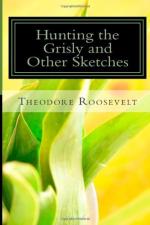The true time of plenty for bears is the berry season. Then they feast ravenously on huckleberries, blueberries, kinnikinnic berries, buffalo berries, wild plums, elderberries, and scores of other fruits. They often smash all the bushes in a berry patch, gathering the fruit with half-luxurious, half-laborious greed, sitting on their haunches, and sweeping the berries into their mouths with dexterous paws. So absorbed do they become in their feasts on the luscious fruit that they grow reckless of their safety, and feed in broad daylight, almost at midday; while in some of the thickets, especially those of the mountain haws, they make so much noise in smashing the branches that it is a comparatively easy matter to approach them unheard. That still-hunter is in luck who in the fall finds an accessible berry-covered hillside which is haunted by bears; but, as a rule, the berry bushes do not grow close enough together to give the hunter much chance.
Like most other wild animals, bears which have known the neighborhood of man are beasts of the darkness, or at least of the dusk and the gloaming. But they are by no means such true night-lovers as the big cats and the wolves. In regions where they know little of hunters they roam about freely in the daylight, and in cool weather are even apt to take their noontide slumbers basking in the sun. Where they are much hunted they finally almost reverse their natural habits and sleep throughout the hours of light, only venturing abroad after nightfall and before sunrise; but even yet this is not the habit of those bears which exist in the wilder localities where they are still plentiful. In these places they sleep, or at least rest, during the hours of greatest heat, and again in the middle part of the night, unless there is a full moon. They start on their rambles for food about mid-afternoon, and end their morning roaming soon after the sun is above the horizon. If the moon is full, however, they may feed all night long, and then wander but little in the daytime.




